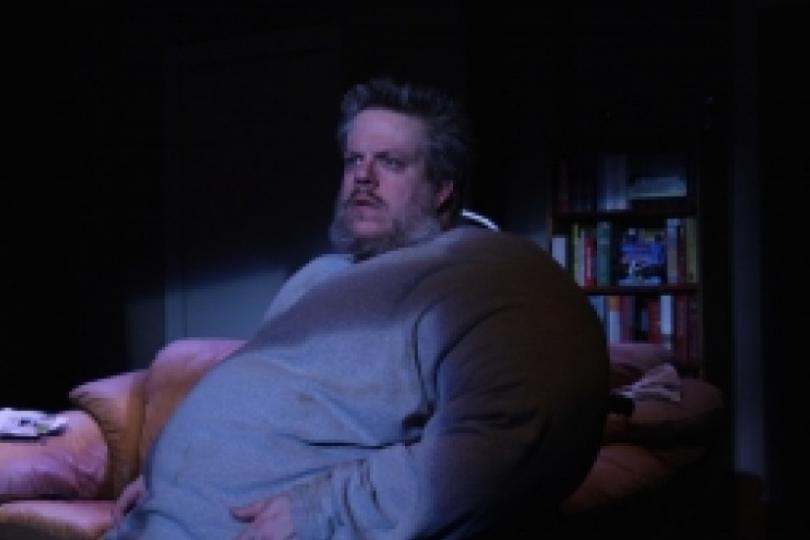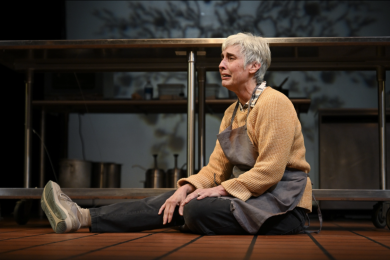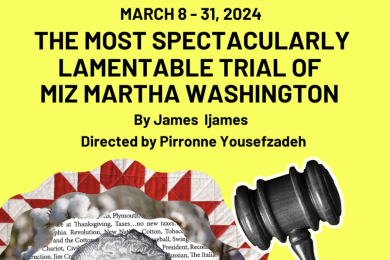It’s appropriate that Walking Shadow is partnering with Mixed Blood to present Samuel Hunter’s
The Whale—as these two theaters (along with Pillsbury House Theatre), are boldly programming season after season of contemporary playwrights. The Jungle may do its occasional
Detroit, the Guthrie an Adam Rapp, but it’s really these companies that make sure a city often boastful of its theater scene remains hooked into the broader conversation around new plays.
The Whale has been making the rounds of theaters across the country, and Mr. Hunter was recently awarded a prestigious MacArthur Foundation “Genius” grant—this is a play that people who track new work need to see.
The Whale’s center of gravity—in more than one sense—is a shut-in named Charlie who makes his living as an Internet composition teacher. He’s a divorced dad who hasn’t seen his daughter in 15 years, whose main point of human contact is a nurse who takes care of him and buys his groceries. He also weighs over 500 pounds.
As conceived by Hunter and executed by Zach Curtis, Charlie is a whale of a character—intense, self-deprecating, strong-willed, pathetic, stubborn, weak—he is both Captain Ahab and Moby Dick, operatic in scope. As the play draws us into Charlie’s almost entirely self-created world, there’s intimations of tragedy with a capital T—a bitter-sweet
Exit The King vibe: right in front of us this fully-formed human being is going to let himself die.
But
The Whale sends Charley on a far more naturalistic journey than Ionesco’s absurdist King, and that’s how it started to lose me. I’m not against kitchen sink realism, but the structure of the piece often felt so over-determined I wondered why it remained moored to such a traditional form.
Exploring naturalism
I always thought of naturalism as a way to show life as it’s actually lived, to throw well-rounded characters onto the stage and watch as they react to each other and the circumstances of the story. To put into practice the old playwriting adage, “character creates plot.” Often in
The Whale though, the opposite seemed true, the people subordinating themselves to the demands of the play’s design—-as in one extreme case when Charlie is literally rolled offstage so two other characters can have the stage to themselves. The characters seemed oddly cooperative with the set-ups the playwright wanted to achieve—there was never a feeling of the unpredictability of real life, the irrational volatility of real human beings. When somebody was told to go into the hall, or even leave—they just shrugged and did it.
Revelations are hidden from us in ways that feel rigged (there’s no reason for the characters to keep these secrets other than to surprise the audience). Aspects of Charlie’s life that cry out for depth are passed over in favor of interactions that don’t even involve our mighty hero. It’s not for me to tell a playwright which scenes to write, but to ask why those scenes take up real estate he might have used to further explore a beautifully wrought main character.
Charlie’s Nurse, whose reasons for taking care of him are revealed to be deeply personal, is also his enabler, bringing him buckets of KFC and handfuls of meatball subs. Do I know men and women who enable bad behavior even in those they love—absolutely. But I don’t expect a naturalistic play to merely show me what I see in the world around me. I expect the play to help me better understand what I see in the world around me. Or, at least, to see those aspects of real life dramatized in a way that penetrates the fog of my day-to-day acknowledgment of life’s troubles, my world-weary shrug of “Damn—enablers.”
Sharp and entertaining but. . .
I despise when a reviewer or an audience member talks about the play that should have been rather than the play they actually saw—that’s not what I’m after here. Nor am I laying this all at the playwright’s feet—-this is the only production of
The Whale I’ve seen. And, while so much of the writing and performance was sharp and entertaining, I’m trying to understand why it ultimately left me cold.
It may be that certain kinds of naturalism feel like shorthand—“oh, yeah, I know angry teenagers, friends who are enablers, supposedly religious people who smoke pot—
this play is so real.” When our familiarity with the time and place is used to sidestep insight rather than encourage it, I get impatient with the form. If you’re going to proscribe every moment—to manipulate your characters and their interactions so your checklist is achieved—why bother with naturalism at all? I was reminded of the 20% Theatre Company production of Gina Gionfriddo’s
Rapture, Blister, Burn earlier this year: a witty, entertaining play that was—at the same time—harder to suspend disbelief for than the movie
Interstellar.
Maybe I just don’t get naturalism. And I’m aware this might be a matter of taste. But too many times,
The Whale left unexplored moments that the real people in my mostly naturalistic life would have definitely unpacked—or if not, would have paid some price for avoiding. Amy Rummenie’s direction is appropriately unobtrusive, and Katie Adducci (as that daughter) matches Mr. Curtis’ intensity, but I felt cheated out of a great character’s story—-as if Charlie’s life were being sketched rather than dived into. Yes, teens are angry, friends sometimes hurt as much as they help, people often do the worst damage to themselves, but I knew all that coming in.





